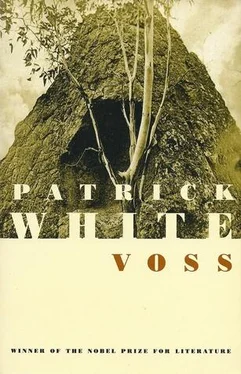‘Well,’ decided Dick, ‘you are a sly one, after all. And lookin’ in at windows.’
The cavalcade, which had crossed the white and glaring space before the wharf, was reining in the other side of such crates and cargo stuff as had not yet been loaded, amongst the straggling groups of early spectators, men who had taken off their coats in the warm sun, and their women who were wearing everything. The riders drew to a standstill, and were exchanging politenesses with the ornithologist, who was by now arrived at their stirrup-irons.
‘I can imagine your emotions, Palfreyman, on such an occasion,’ said the merchant.
How people act or feel on specific occasions had been reduced for Mr Bonner to the way in which he had been told people do act and feel. Within this rather rudimentary, if rigid, structure of behaviour, he himself did also behave with jolly or grave precision, according to rule. For such souls, the history primers and the newspapers will continue to be written.
Now he was enjoying the motions suited to the occasion, and although he took it for granted that others must be similarly moved, he would not really have cared if they were not. His own feelings were so positive they did not require reinforcing.
Palfreyman, who had opened his mouth a couple of times, could not find sufficiently innocent words.
‘It is too soon,’ he began at last, but left off.
The merchant, however, was not waiting on answers.
‘Only the wind is needed,’ he said anxiously. ‘There is no wind. Or not to speak of.’
While his cobby horse kept him revolving, he was able to consider all quarters of the compass.
‘I am told we may expect the change at three o’clock,’ Palfreyman contributed, how unnecessarily, he himself knew.
‘The change? The wind,’ recollected the merchant. ‘Oh, yes. The brickfielder commonly gets up round three o’clock of an afternoon.’
And at once, he began to shrug his shoulders, as if his excellent coat did not fit, or else it was some other physical discomfort, of rheumatism perhaps.
‘Where is Voss, though?’ he asked, looking about him in hopes of not seeing.
‘Mr Voss is below.’ Now Palfreyman had no intention of being disloyal, but did smile. ‘He is about some business of seeing that the equipment is safely stowed.’
‘In a battle between German precision and German mysticism,’ laughed Lieutenant Radclyffe with kindly unkindness. ‘Wonder which will win.’
Battles of his own were still fresh, although he was not thinking at that moment of his conversation with Laura Trevelyan at the dinner-party. He would forget the causes of his suffering while continuing to suffer. He was like a man in his sleep, who will lunge out at an actual mosquito, but return always to his more convincing dream. Still, the mosquito continues to buzz, and if, for Tom Radclyffe, Laura was that mosquito, by some calculation of the sleeping man, Voss was the sting.
So he must take steps to protect himself.
‘When Voss is concerned,’ the Lieutenant laughed, ‘I will put my money on the clouds of theory rather than the knife-edge of practice.’
‘I have to admit there have been few signs of method,’ blurted the merchant with frightful daring, though he did not look over his shoulder.
It began to seem terrible to Palfreyman that Voss should be the subject of criticism. If he himself criticized, he did so in private, and in a state of some considerable distress.
‘His methods are not those of other men, perhaps,’ his principles forced him to say.
How dull it is when people cease to talk about things , sighed Belle Bonner, whose glance had begun to stray, and did seize most sensuously on the sight of a red apple from which a little boy was tearing the flesh with noisy bite.
‘No,’ said Mr Bonner, realizing his slip. ‘He is different from other men. How different, only time will show. I am encouraged that you are confident, Palfreyman. It justifies my own initial confidence in Mr Voss.’
Palfreyman was sorry for the merchant, who chewed beef more happily than words.
‘In any case,’ said the man on foot, who should have been at a disadvantage, ‘Mr Voss has every confidence in himself, and that is the chief necessity.’
This more or less brought the discussion to a close, which was as well, for several spectators looked as if they might learn to interpret the moon-language that was being spoken. Mr Bonner dismounted and, after giving the reins of his horse to the subordinate Palfreyman to hold, soon restored his spirits to the full by going about and looking at actual objects. The rich man glowed to find himself once more in possession of the physical world.
Laura Trevelyan, who had listened to the conversation, was grateful that the rather inconspicuous, she had thought even characterless ornithologist, with whom she had never exchanged more than half a dozen necessarily polite words, had been the champion of the man whom, on the whole, in spite of her intentions, yes, she despised. Now she wanted desperately, she felt, to talk to the German’s friend, in spite of the German himself, purely, she told herself, out of admiration for moral strength. So she waited upon an opportunity.
This came quickly, but not without humiliation. It might have been expected, she decided later, of anyone foolish enough to expose herself to a scene as humiliating as that which had taken place so recently in the garden. Now this other, certainly minor, but still distasteful incident occurred.
The elegant riding-crop that Laura Trevelyan was carrying in her hand, fell, by purest accident as it happened, though to any observer it must have appeared the most obvious design, at the feet of Mr Palfreyman, who bent down, of course, and in a rush of blood, and all politeness, returned the little whip to its owner.
‘I see the handle is of some Eastern design,’ Palfreyman remarked.
He made it very quickly into something of scientific interest.
‘Yes. Indian, I believe. It was given to me when I was a child by a sea-captain, an acquaintance of my uncle’s, whose ship would sometimes call at Sydney.’
The young woman was looking most intently at the object of her shame, but could not concentrate enough. Hot, insufferable waves were surging in her contracted throat. Moreover, she could not remember with clearness her motives for wishing to speak, however discreetly, to this man.
‘It is a pity to use such a thing, and perhaps break it,’ Palfreyman said. ‘Would it not be seen to greater advantage in a cabinet?’
Sensing that the young woman was emotionally upset, he treated the riding-crop with exaggerated solicitude, which made her sorrier for herself, and him to wonder what secrets she was withholding from him. There was no reason to suppose that he was of greater importance to her than he had been on the night of the party. He would not allow himself to believe that she was in any way using him. Palfreyman, who was a man of some intuition, did not understand the female sex, in spite of his respect for it.
Nothing was altogether satisfactory, Laura felt, who continued to look at her little whip. She was no longer pale, however, and her cheeks and mouth had filled out, with self-pity, it could have been.
‘It is not of great use,’ she said, ‘and not of exceptional beauty. I no longer give it much thought, except to bring it. From habit, you know. In the beginning it pleased me because it was something unusual, and foreign. I liked to think I might visit foreign places, such as the one from which my present had come. I would dream about the Indies. Mauritius, Zanzibar. Names should be charms, Mr Palfreyman. I used to hope that, by saying some of them often enough, I might evoke reality.’
All the while her black mare was pawing up the dust, some of which, she noticed from a distance, was settling on the hem of her skirt.
Читать дальше












